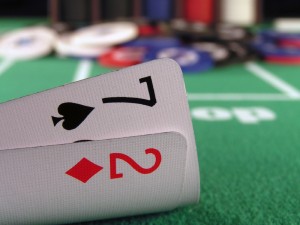Most people know that all of the great Hold’em players play their opponents and not their own hands. Most players believe this is just a matter of sensing weakness in their opponent and then exploiting this weakness by stealing a pot. They believe it is just a matter of sensing when their opponents are bluffing. But playing your opponent works on many levels. Sometimes you can be absolutely confident that your opponent has a reasonably strong hand and still find a way to steal a pot. Let’s look at an example to demonstrate this concept.
I was involved in a hand at the New Zealand poker championships a couple of years ago when I knew I was beat but was absolutely confident that it really didn’t matter. We were in the first few levels of the championship when this hand came up. I raised under-the-gun with 33 with a standard size raise of about 3 times the big blind. It was folded around to the small blind who called. The flop came up 652 and the small blind bet out about half the size of the pot.
The first key point about this hand was that I knew the player in the small blind very well. He happened to be Andrew Dimock, a strong pro from New Zealand who also helped edit my book, Internet Texas Hold’em. Andrew and I shared many discussions on poker together so I was quite aware of his style of play. I also knew that he respected my play also. Let’s get back to the hand.
First, he called my preflop raise so this ruled out a holding like a premium pair. Even if he slowplayed a hand like AA, betting out the flop just wouldn’t make sense. A flop of all rags was unlikely to help an opponent like Andrew calling a raise out of position. If he managed to flop a set on this flop it also wouldn’t make sense to bet out. His act of betting out indicated that he was worried about free cards and/or he was trying to get a sense of where he stood. After evaluating all of the possible options, I was close to certain that he held a medium pocket pair like 88-JJ. I was a sunk duck…he had me beat! I have to fold…
But then the brain waves started rolling. It is a huge advantage when you know what your opponent is holding. I knew what he had but he didn’t know my hand! He had a strong hand but not one which you can play with a lot of confidence. I realized that this pot belonged 100% to me. I moved all-in.
Andrew respected my play and I was confident that he wouldn’t think I would risk my tournament (I was defending my championship that year) on a stone cold bluff. He thought for a while, agonized over folding his hand, and then threw his hand face up in the muck…99. Just as he had read my book, I had read Andrew like a book. I knew his hand and I knew what I could do to win the pot.
Andrew did have a weakness in this hand but it wasn’t the normal kind of weakness that you expect to be able to exploit. Normally when you think you are beat you should fold but there are many times in a tournament when you feel there is a good chance of taking a pot even though you know your opponent holds a strong but vulnerable hand. But to make these types of plays you have to be confident that your opponent is one who can lay down a hand.
The key is representing a hand that can beat the one your opponent is holding. Other examples include:
· Representing a flush when you are pretty confident your opponent has a big pair
· Representing a set against a big overpair (although I wouldn’t try this play on the Internet)
· Representing a premium pocket pair.
There was a hand in last year’s World Series where Greg Raymer suddenly limped from early position. This was quite a strange play from Greg as he almost always came in with a raise. The flop came up Axx and Greg check-raised trying to represent a set of aces. On the turn, Greg again check-raised. His opponent John Murphy didn’t buy it and moved all-in. Greg folded and John turned over two rag cards with a flush draw. The ESPN cameras showed Greg was on a complete bluff (I believe the hand was T9).
In this hand, Greg tried to represent that he slowplayed AA before the flop but his opponent took it to even another level and read Greg for trying to represent a big hand. Expert poker moves on many different levels and John Murphy made a fantastic read on this hand. But in the right situation against the right opponent, sometimes you can take a pot even when you know you are beat.
By the way, Andrew got the best of me a little later in the tournament when I moved over him with 99. He called with 88 and my chance of repeating vanished as I watched in anguish as an 8 fell on the river.
Matthew is author of Internet Texas Hold’em: Winning Strategies from an Internet Pro .
Submit your review | |




